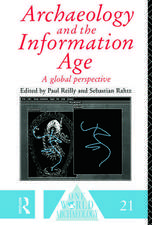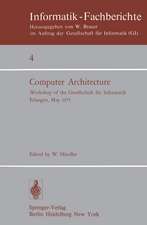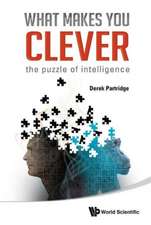The Seductive Computer: Why IT Systems Always Fail
Autor Derek Partridgeen Limba Engleză Paperback – 2 noi 2010
The Seductive Computer argues that the fundamental nature of programming technology itself is the real culprit; it promises perfection but can only deliver emergent chaos. It is also an insidiously compelling technology, peculiarly male oriented.
IT systems, an unavoidable and increasing reality in all our lives, are something new to man - large-scale discrete complexity. The Seductive Computer explains this novelty that defies human understanding.
This book illustrates in a simple yet thorough manner the underlying concepts necessary for understanding the IT-system crisis - not ‘How To Program’ but what the demands of programming are. It then proceeds to lay out the full gamut of issues - all stemming from the nature of the technology.
From development to maintenance IT-system personnel are grappling with incipient chaos. The technicians are seduced by the detailed challenge of the technology. The scientists are seduced by the promises of their technology. The managers and users are seduced by the mysteries of the technology. No IT system is ever fully understood by anyone, so surprising behaviours will always emerge.
What can be done? We must rein in our expectations of IT systems: what they can do, and how reliably they can do it. On the positive side, The Seductive Computer discusses novel paradigms that look beyond the current discrete technology: neural computing and precise approximation computing.
Preț: 260.33 lei
Preț vechi: 325.41 lei
-20% Nou
Puncte Express: 390
Preț estimativ în valută:
49.81€ • 52.01$ • 41.23£
49.81€ • 52.01$ • 41.23£
Carte disponibilă
Livrare economică 15-29 martie
Preluare comenzi: 021 569.72.76
Specificații
ISBN-13: 9781849964975
ISBN-10: 1849964971
Pagini: 340
Ilustrații: XVI, 323 p. 56 illus., 6 illus. in color.
Dimensiuni: 155 x 235 x 20 mm
Greutate: 0.48 kg
Ediția:2011
Editura: SPRINGER LONDON
Colecția Springer
Locul publicării:London, United Kingdom
ISBN-10: 1849964971
Pagini: 340
Ilustrații: XVI, 323 p. 56 illus., 6 illus. in color.
Dimensiuni: 155 x 235 x 20 mm
Greutate: 0.48 kg
Ediția:2011
Editura: SPRINGER LONDON
Colecția Springer
Locul publicării:London, United Kingdom
Public țintă
Popular/generalCuprins
Preface.- 1. Introduction.- I The Joy Of Programming.- 2. The Happy Hacker: Love At First Byte.- 3. The Reluctant Programmer.- 4. Cooking Up Programs.- 5. Recipes For What?.- 6. Programs: The Good, The Bad And The Verified.- 7. Going To Ground With Symbols.- 8. Hooptedoodle 1 - The Proof Of The Pudding Is In The Science.- 9. The Soft Machine.- 10. Computers Only Do What You Tell Them To Do.- 11. Hooptedoodle 2 - Recursing Through Tescos.- II The Way Of The Seducer.- 12. Intimate Relationships Of The Computational Kind.- 13. Programming With Flair.- 14. Hooptedoodle 3 - The Seductive Gene.- 15. Runaway Programs - Dr Frankenstein’s Predicament.- 16. Sneakaway Programs - Everybody’s Predicament.- 17. Hooptedoodle 4 - Bases For Data Security.- 18. The Roles Of Software In Society.- III Pieces Of Resistance.- 19. Help From Within.- 20. A Moderately Stupid Assistant.- 21. Watching Programs Work - Support For Voyeurism.- 22. Classical Reconditioning: Doing What Happens Naturally.- 23. A Computer That Knows When It’s Wrong.- IV The End Of The Affair.- 24. Analysis & Counselling.- 25.Epilogic.
Recenzii
From the reviews:
“Experienced computer professionals will appreciate this book’s subtitle. Partridge (emer, Univ. of Exeter, UK) has divided the volume into four parts … . Overall, the well-written book provides a good starting point for serious discussions. It will be most useful for those with significant experience with computer systems since they will be able to fully appreciate the arguments presented. Summing Up: Recommended. Upper-division undergraduates and above.” (M. B. DuBois, Choice, Vol. 48 (9), May, 2011)
“The author, Derek Partridge, dissects the art of computer programming carefully detailing all the problems, traps and gotchas that result in computer programs … . In my opinion the executives overseeing any major IT project would find the information in this book to be quite valuable … .” (Brent Sims, Goodreads, June, 2011)
“The Seductive Computer is a very enlightening book chocked full of interesting facts, figures, and examples.” (John, Goodreads, March, 2011)
“Partridge is a technologist, and in some sense an optimist. … written for a general educated audience, and builds its arguments from both well-documented historical examples and detailed analyses of an apparently simple programming task … . There are plentiful pointers towards supporting data and further reading, and an extensive glossary. … The Seductive Computer is … well worth reading, if only for the schadenfreude of realising that practitioners of the high-tech arts have conceptual problems at least as deep as philosophy’s own.” (Chris Fields, Journal of Experimental & Theoretical Artificial Intelligence, January, 2012)
“Throughout the book, Partridge gives details of both conventional engineering and IT disasters … . The table of contents is thorough, there is a good index and glossary, and each chapter has relevant endnotes. … Partridge’s book alerts readers to the true lack of reliability ofcomputer programs and the risk to which citizens in our modern world are exposed. … This is a book that should be compulsory reading for computer programmers and IT project managers.” (David B. Henderson, ACM Computing Reviews, December, 2011)
“Experienced computer professionals will appreciate this book’s subtitle. Partridge (emer, Univ. of Exeter, UK) has divided the volume into four parts … . Overall, the well-written book provides a good starting point for serious discussions. It will be most useful for those with significant experience with computer systems since they will be able to fully appreciate the arguments presented. Summing Up: Recommended. Upper-division undergraduates and above.” (M. B. DuBois, Choice, Vol. 48 (9), May, 2011)
“The author, Derek Partridge, dissects the art of computer programming carefully detailing all the problems, traps and gotchas that result in computer programs … . In my opinion the executives overseeing any major IT project would find the information in this book to be quite valuable … .” (Brent Sims, Goodreads, June, 2011)
“The Seductive Computer is a very enlightening book chocked full of interesting facts, figures, and examples.” (John, Goodreads, March, 2011)
“Partridge is a technologist, and in some sense an optimist. … written for a general educated audience, and builds its arguments from both well-documented historical examples and detailed analyses of an apparently simple programming task … . There are plentiful pointers towards supporting data and further reading, and an extensive glossary. … The Seductive Computer is … well worth reading, if only for the schadenfreude of realising that practitioners of the high-tech arts have conceptual problems at least as deep as philosophy’s own.” (Chris Fields, Journal of Experimental & Theoretical Artificial Intelligence, January, 2012)
“Throughout the book, Partridge gives details of both conventional engineering and IT disasters … . The table of contents is thorough, there is a good index and glossary, and each chapter has relevant endnotes. … Partridge’s book alerts readers to the true lack of reliability ofcomputer programs and the risk to which citizens in our modern world are exposed. … This is a book that should be compulsory reading for computer programmers and IT project managers.” (David B. Henderson, ACM Computing Reviews, December, 2011)
Notă biografică
Derek Partridge gained his PhD in Computer Science from Imperial College, London in 1972. For the next 15 years he worked as a researcher and a teacher in Universities around the world --- Africa, Australia, Malaysia, Chile but primarily in the USA. In 1987 he returned to the UK to the Chair of Computer Science at Exeter University. He has published more than one hundred articles on Artificial Intelligence and Software Engineering as well as numerous books, one of which was translated into French, German and Italian. He retired from the University of Exeter in 2008, and now reads, writes and manages his private nature reserve on the edge of Dartmoor National Park in Devon.
Textul de pe ultima copertă
IT systems explode budget estimates, bust production deadlines by years, and then fail to work properly. Why this IT-system crisis? Poor programmers? Inadequate project management? No.
The Seductive Computer argues that the fundamental nature of programming technology itself is the real culprit; it promises perfection but can only deliver emergent chaos. It is also an insidiously compelling technology, peculiarly male oriented.
IT systems, an unavoidable and increasing reality in all our lives, are something new to man - large-scale discrete complexity. The Seductive Computer explains this novelty that defies human understanding.
This book illustrates in a simple yet thorough manner the underlying concepts necessary for understanding the IT-system crisis - not ‘How To Program’ but what the demands of programming are. It then proceeds to lay out the full gamut of issues - all stemming from the nature of the technology.
From development to maintenance IT-system personnel are grappling with incipient chaos. The technicians are seduced by the detailed challenge of the technology. The scientists are seduced by the promises of their technology. The managers and users are seduced by the mysteries of the technology. No IT system is ever fully understood by anyone, so surprising behaviours will always emerge.
What can be done? We must rein in our expectations of IT systems: what they can do, and how reliably they can do it. On the positive side, The Seductive Computer discusses novel paradigms that look beyond the current discrete technology: neural computing and precise approximationcomputing.
The Seductive Computer argues that the fundamental nature of programming technology itself is the real culprit; it promises perfection but can only deliver emergent chaos. It is also an insidiously compelling technology, peculiarly male oriented.
IT systems, an unavoidable and increasing reality in all our lives, are something new to man - large-scale discrete complexity. The Seductive Computer explains this novelty that defies human understanding.
This book illustrates in a simple yet thorough manner the underlying concepts necessary for understanding the IT-system crisis - not ‘How To Program’ but what the demands of programming are. It then proceeds to lay out the full gamut of issues - all stemming from the nature of the technology.
From development to maintenance IT-system personnel are grappling with incipient chaos. The technicians are seduced by the detailed challenge of the technology. The scientists are seduced by the promises of their technology. The managers and users are seduced by the mysteries of the technology. No IT system is ever fully understood by anyone, so surprising behaviours will always emerge.
What can be done? We must rein in our expectations of IT systems: what they can do, and how reliably they can do it. On the positive side, The Seductive Computer discusses novel paradigms that look beyond the current discrete technology: neural computing and precise approximationcomputing.
Caracteristici
No other book attempts a comprehensive explanation of this fiasco of modern life - certainly not in way that is accessible to the layman, at one level of reading, and is also informatively provocative for the "expert" at the most-detailed level of reading The attempt to deal with the problem of essential detail This book addresses the "software crisis" issue Includes supplementary material: sn.pub/extras
























